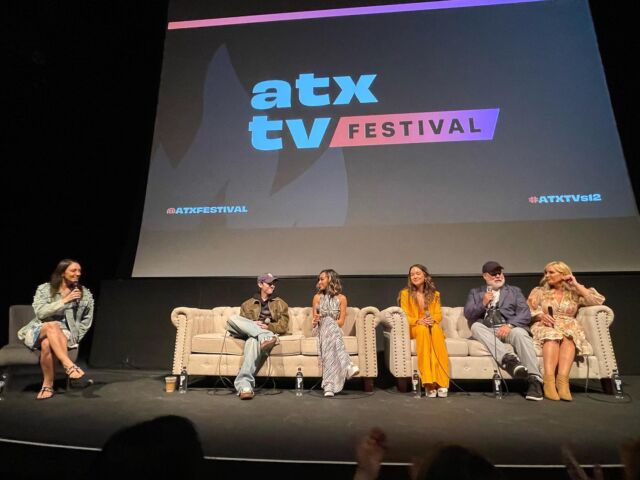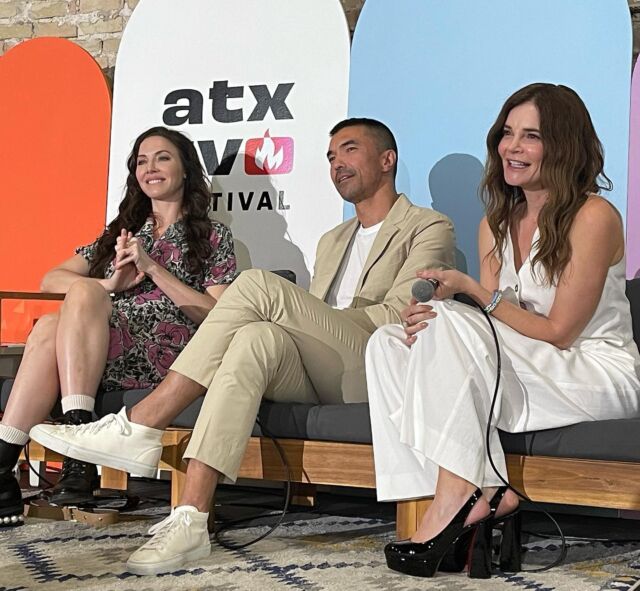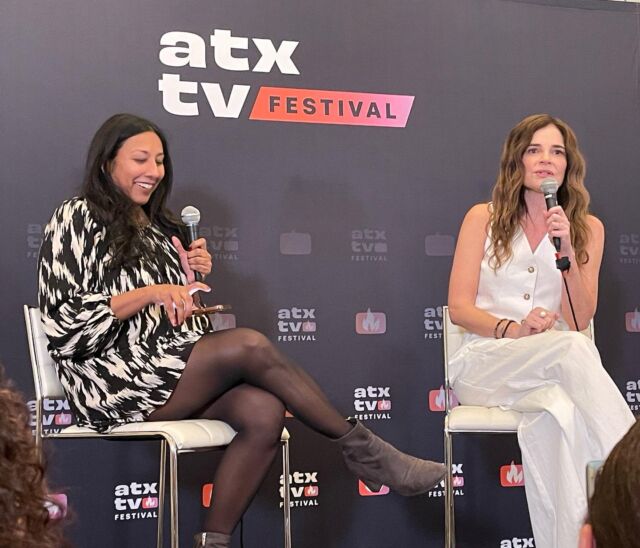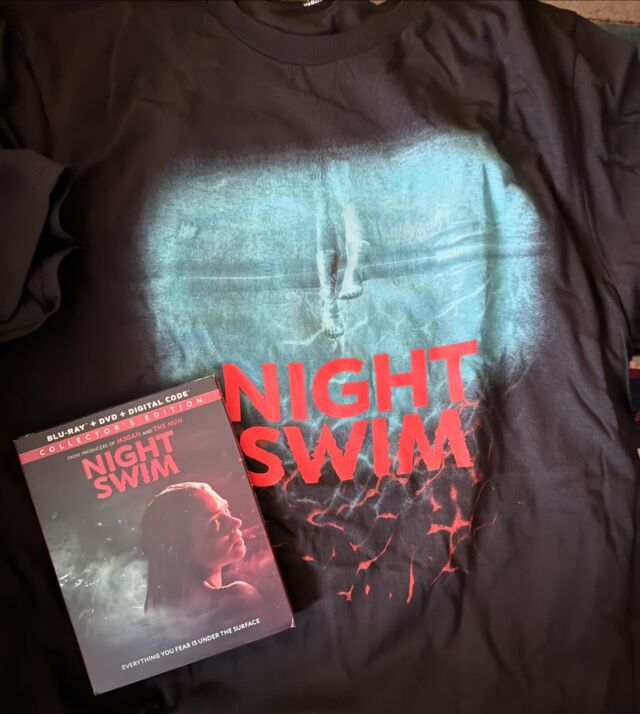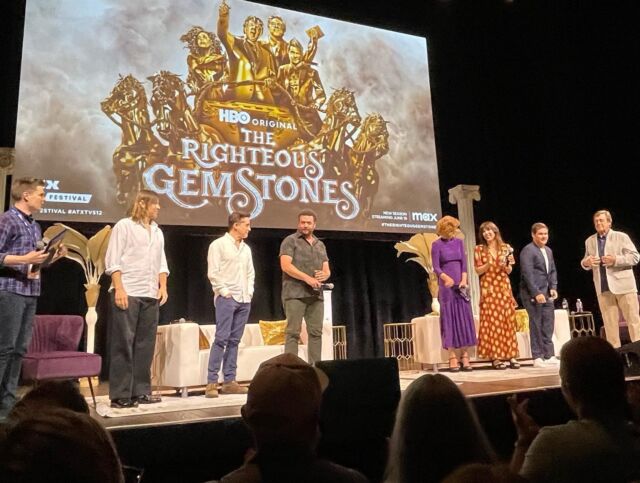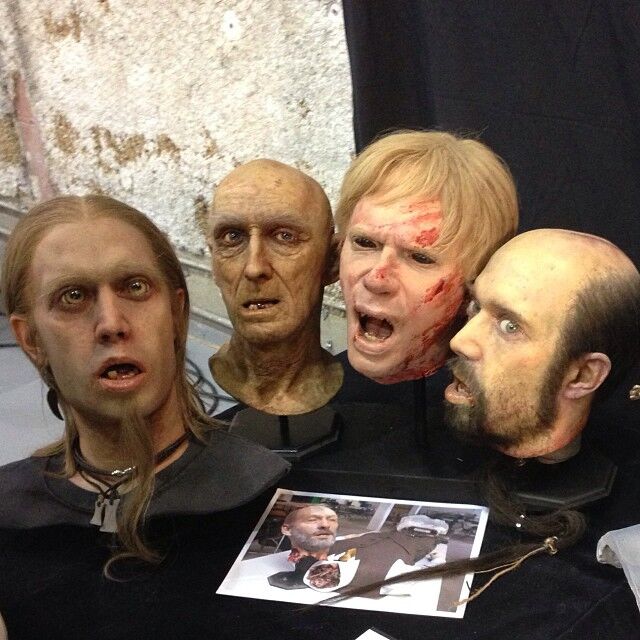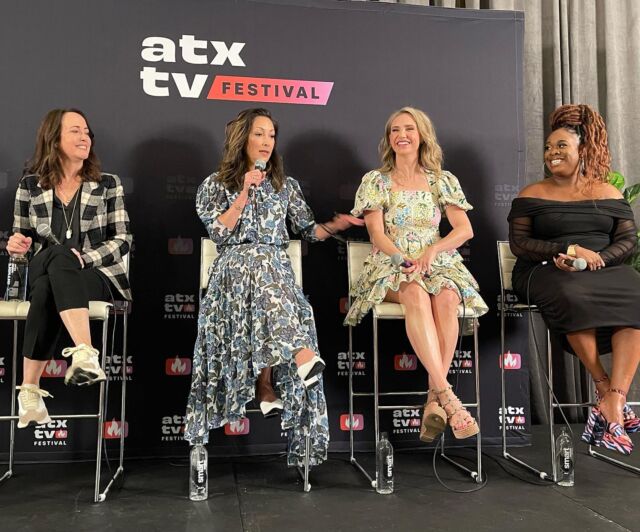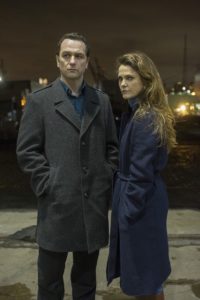 FX recently held a media conference call with the showrunners of The Americans, Joe Weisberg and Joel Fields, to do a post mortem on tonight’s series finale. Now that the episode has aired on the East Coast, we can share with you what they had to say about tonight’s finale and the series as a whole. Tonight’s finale left some ambiguities, such as What were Philip and Elizabeth thinking as they looked out onto their strange new city? What were Paige’s plans now that she was back in America but on the run? And Why did Stan let the Jennings go? The showrunners stated several times that there were many things in the finale that they purposely left up to the viewer to decide. While they were pretty steadfast in their decision not to clarify these open-ended moments, they do provide a glimpse into the motivations of the characters and their own thought processes while writing the episode.
FX recently held a media conference call with the showrunners of The Americans, Joe Weisberg and Joel Fields, to do a post mortem on tonight’s series finale. Now that the episode has aired on the East Coast, we can share with you what they had to say about tonight’s finale and the series as a whole. Tonight’s finale left some ambiguities, such as What were Philip and Elizabeth thinking as they looked out onto their strange new city? What were Paige’s plans now that she was back in America but on the run? And Why did Stan let the Jennings go? The showrunners stated several times that there were many things in the finale that they purposely left up to the viewer to decide. While they were pretty steadfast in their decision not to clarify these open-ended moments, they do provide a glimpse into the motivations of the characters and their own thought processes while writing the episode.
I opened the call with questions regarding the ending, and about the decision to not kill off any of the characters. This was followed by a lot of other great questions by other journalists:
When the show first started, did you already have an idea of how you wanted to end and if so did it differ from what we got?
Joe Weisberg: At the very beginning no. There was no idea of how the show was going to end. But when we got somewhere around the end of the first season, beginning of the second season, we suddenly got a very clear sense of the ending of the show. And we had no idea if that ending was going to stick. In fact if you had asked us, we would have told you oh, probably it won’t. Because we’ve got so much story to tell between now and then. And as you develop stories and as characters change, odds are any ending you thought you were going to tell is going to end up being changed by all the things that came in between. But then we got to the end of the show and sure enough that ending was still the one that we like best.
Did you ever have any thoughts of killing off any of the Jennings or having them get arrested or even killing off Stan?
Joel Fields: On the one hand we also did our due diligence by running through as many story options as we could in our heads. So we test drove almost every ending you could imagine. But this was always the ending that felt right. It’s the ending that presented itself early on to us. And it never really shifted, even as we moved forward toward it.
Could you talk about the music choice for the train scene? Were you looking for something that would be like this is our big memorable moment?
Joel Fields: We don’t think about looking for particular moments. We just think about what’s going to be most emotional. In fact, if anything with the music, we want to find something that’s going to support the emotion, but not distract and become about a particular song. I actually think we listened to hundreds of songs next to that montage. And there were a lot that didn’t work a lot of great songs didn’t work some songs worked really well, but when we heard that U2 there it was just magic.
What songs didn’t work?
Joel Fields: No comment by the non-comment sirs. You know, we just don’t want to say in part because we’d hate to have people do a You Tube mashup of that sequence with other songs. At least not the ones from our heads. Now that I’ve said it, of course I imagine somebody’s going to a very knee slappingly funny version of that. But that’s okay. It won’t be our fault.
What was Elizabeth thinking when she was looking at those paintings? And also, why did the one she ended up taking end up in that dream sequence?
Joe Weisberg: We thought a lot about choosing the artist and the paintings that were going to be in the season. And we really were thinking about how Elizabeth was somebody who had been brought up with essentially very little exposure to art other than, sort of, socialist realism. And how her whole idea of art was going to be essentially dismissive. [The] only purpose of art was really to serve a political function to the degree that she really thought about it at all.
So the question was what kind art was going to, kind of penetrate into her soul, against her will and without her even realizing it was happening? And that’s what we imagine happening as she was stuck in that room for hours and hours, often with Erica asleep staring at these pictures. What could, as she looked at, worm it’s way into her, [and] have this effect on her without her realizing it. And we felt that all those incredible paintings of Alyssa’s which were so beautiful and so dark and so powerful would just make her feel things, again, without her necessarily even knowing it was happening.
And in a way that painting mother was a particularly penetrating and powerful one. I don’t know that we want to say all the reasons that we felt that would be a particularly powerful one for Elizabeth. We like to, soft of, leave that up to the audiences’ imagination. But we felt that that was the one that she would keep coming back to and back to again and again. And then, of course, not even consciously choose it, but have her eye keep being drawn back to it until Erica’s husband told her to just go ahead and take it.
I was also curious about the dream itself. We see Gregory again, she has this line where she says she never wanted kids anyway, we see Paige and Henry appearing inside of a painting that looks like one of Erica’s paintings. What was behind wanting to make sure Elizabeth had that particular moment in the finale?
Joel Fields: That moment is one that came fairly late in the evolution of the script. We were both looking for a way to move forward through time there. But also to expose everything we could about what Elizabeth was feeling. And we really struggle with dream sequences. We tend not to do them because they’re just so tricky and they have such a high probability of going wrong.
But there just seemed to be so much in her subconscious there. And this seemed like a great way to put it together and shake it up and just let it all be. Everything from the fact that this whole season had been one in which her soul had been stirred by art in unexpected ways as Joe said. Had she certainly had never thought about the fact that her first true love had been an art collector who loved and had an understanding for art that she also couldn’t relate to back then. Everything from that to the fact that the – that moment that she had talked about in the first season was the moment that she was starting a family. And now here she was leaving them behind. And looking across the aisle at this man who had over all these seasons truly become her husband.
In the final scene when Elizabeth and Phillip were standing there just looking at their future, did you have something that you believed was going on in their minds? Was there an internal dialogue?
Joe Weisberg: We want to walk a fine line there, because we’re very reluctant to impose too much of our thought process on a moment like that, where we really want to let the scene speak for itself. And the audience [to] have their own moment with it. Because we think everybody’s going to view that different. The other day somebody told us something about what they were feeling in that scene that was profoundly different anything we ever felt about it. But it’s still not our place to quash that or get in between somebody and their experience of the scene.
But it’s probably, I don’t know. I wouldn’t say that we felt that there was an inner dialogue that was so different from the outer dialogue exactly. Certainly a lot of very profound feelings going on for both of them and I think it’s really nice what you said. That they were looking at their future as they looked off toward that city that was almost a strange, almost a foreign city to them after coming back after all these years. And both trying obviously to grapple with and process this terrible, terrible tragic loss of their children. Something they never ever would have been able to imagine even really a few days ago.
Did you have a game plan in mind when you had Paige in Claudia’s apartment drinking her vodka? Does she have something that she wants to do, or is it the same thing, we get to guess?
Joel Fields: Well unfortunately, I think that’s another one where the intent is really to put it into the hands of the viewers and to the hearts of the viewers. It’s not because we’re hiding something there, but it’s because that moment’s not a moment about plot. That’s a moment about where she’s at personally.
Many viewers wanted very viscerally wanted Elizabeth and Phillip to be punished for everything they had done in the course of the season. How would you respond to those people?
Joel Fields: Well, on the one hand I’d say we’re glad that they’re emotionally engaged and invested. And on the other hand, I think we’d say we’re here to explore the characters. And try to lay out the best drama for them. And we’ll leave it to the audience to decide whether this was punishment enough or satisfying enough. That’s really one of the exciting things about getting to the end for us is on the one hand, there’s been an increase of obsessive creative control, but it’s funny.
Your question is causing me to think about something that I hadn’t really thought about yet at all which is two days ago we did our last piece of actual work on the film. We did a final picture adjustment on a couple of the effect shots at the end. And that’s it. We’re done. And boy we obsessed just more over this season than any season prior and more over the final episode than any episode before. And that’s been a real – that’s gripped us tightly. But I suddenly realized as you asked that question there’s been a letting go too. And it’s nice to be able to turn it over. And not have any more to do on it.
Joe Weisberg: You know, honestly too, Mike I think that – I think punishment is a funny word. It rings a, sort of, funny for us, I think. But I think the idea of there being a kind of a tragedy that hangs over the spirit of this show. And that it feels like some sort of tragedy is – or some kind of tragic ending is called for, some kind of toll is something that we probably felt. And to us the question is how does that – how big is that tragedy going to be and where does it live? And does it live in, sort of, the emotional world? Or does it have to live in some sort of very direct type of death or something like that. And we explored that and thought about that a lot.
And ultimately the tragedy taking place inside the family felt exactly right to us. So the fact that they lose their children just resonated more deeply with us. That every going on with their lives but with the loss of the children was to us the most powerful and in a way the most painful thing that could happen to anybody.
Did you film a scene with Stan talking to Henry or was it always meant to be part of the montage?
Joel Fields: That was always part of the montage. We never had written dialogue there. We knew that Noah and Kendrick and our director Chris Long would know what to do with that moment. And did seem to us that particular words were necessary. And we were right. We feel like just in their – in their effect, you get everything that we wanted to convey in that scene.
And did Dan drop every bombshell right then and there in the middle of hockey practice or was it, you know, your parents aren’t coming back right now?
Joe Weisberg: You know, in our minds he told him the truth there. That’s what we picture happening. That’s sure how it looked to us.
I know this is up for our interpretation, but I was wondering personally, what did you think the kids’ futures were, for Paige and Henry?
Joe Weisberg: Well, you’re right, we’re going to pretty much leave that up to you. You know, it’s worth noting that in a way, we always from the very beginning of the show thought of Henry as being the kind of most American or most fully American person in this whole family then in a way he not really inherited the Russian soul of either of his parents. Whereas Paige it seemed to us was American but had also gotten her mom and dad’s Russian soul. And, you factor that in. If you agree with that, which you may or may not. But that seemed to be the story that got told. You can think about that when you think about their future and what it might hold for them and what the possibilities are.
But we’re certainly leaving that at the end of show. What extremely dark and tragic and difficult moment for both of them. Everybody’s got a lot of hurdles in front of them. But, who’s to say what they’re going to do with those hurdles?
Did Stan ever drop off the coded message for the Soviets?
Joel Fields: Well we think the thing is the fact that he lets Philip and Elizabeth go is his way of conveying that information. They’ve got the information and their arrival will convey it to the necessary authorities back home.
Did you guys actually think the most shocking thing we could do in the finale is to not kill anybody?
Joe Weisberg: We don’t do it for that reason. What usually guides us in this type of story decision is asking ourselves what feels most likely to really happen? What feels most true? And then that’s not the only step. That’s where we start. We know some of our stories are a little more farfetched and wild than that. But when we’re getting to something really big and really emotional, then we want that to ring as true as possible.
So we start with what do we think the characters would really do? And if that ends up with something like hey, nobody gets killed, we’re aware of the fact that that’s not the most normal way to end one of these stories. And it’s probably going to not, you know, defy the expectations of what this genre usually presents at the end? And in all fairness, I think, we consider that a plus. That it’s, you know, going to surprise people. We were also aware it may disappoint some people. But as long as it rings true and feels emotion to us, we’re happy.
Is one of the reasons you did it that way is because that’s kind of what actually happened to the real people?
Joe Weisberg: Well we didn’t – it’s interesting. This story, of course, has come now about one of the 2010 couples and their family and their kids and all the struggles happening with the kids. But we didn’t know that story at the time we came up with this ending. And, of course, it’s not exactly the same. The kids did initially go back with them. But, in spirit it’s, sort of, emotionally has a lot of that tragedy in it. But no, we did not have that story at our disposal at the time we came up with this one. But it’s probably not a coincidence if they have a similar feeling to them.
I was wondering if there were disagreements in the writer’s room about whether Stan should turn them in or not.
Joel Fields: That’s an interesting question. I don’t recall any, Joe. I mean by that point, we had this story pretty set very early on. And we had pretty much outlined the entire season by the beginning of really by the time we started Season 5, we had a pretty clear sense of what five and six were going to be. So by the time we started writing Season 6, which would have been towards the end of production on Season 5, we were pitching out the whole season. And had a pretty clear sense of where it was going. I don’t think anybody was objecting to or arguing around the move. I think our greatest concern was that it work. That is to say that it feel emotionally true, and not that it was something that was being constructed for the drama. And that we would up working really hard on. We hope we succeeded.
Can you talk a little bit about incorporating McDonald’s into the episode and what that involved?
Joel Fields: No, but we can talk a lot about it.
Joe Weisberg: That’s quite a story. We loved that so much as, sort of an iconic kind of Phillips’s final goodbye to this greatest icon of both American capitalism as he had become enamored of capitalism and sort of as America itself. But it was journey because we need approvals to use something like that form the corporation itself. And that’s not something that McDonald’s had done a lot. [It] took really a lot of work and fortunately, McDonald’s ended up being enthusiastic about it. And we had a really great experience with them. But it was – it just took a lot of work to get to them. And to make it all work.
And there were a lot – and it was all done, sort of, at the last minute. So we weren’t sure it was going to pull off. And there were franchises and everything else. And so, we thought we weren’t necessarily going to be able to do it after we had our hearts so invested in it. And then when it did actually end up all getting pulled off, then our locations’ department, our director, you know, it’s not that easy to find a period McDonald’s. There aren’t that many left.
And then they found that one which as you saw is literally like a dropdown from heaven to be the perfect McGlowing embodiment of everything we wanted to, sort of, represent in that scene. It was so beautiful.
But of course it was not on a roadside at all. It wasn’t on the side of a highway. So we had to create through green screen magic the right location for it with the parking lot. But that also came off seamlessly. And I think one of our favorite moments was as we were figuring out the navigation of getting this all right, we heard that McDonald’s – one of their concerns was that everything – if we were going to do something period set, that it be truly period accurate. And we were told that they actually had a librarian who kept all of the – who kept a record of all of the old signage that they used. And this of course is – was just singing our songs. We’re obsessed with that sort of period history. It was amazing to have that resource. It came together.
Could you talk about crafting the scene with the confrontation between Stan and the Jennings. Did it come naturally or was something that you struggled over?
Joe Weisberg: Number 2.
Joel Fields: Number 2. We think that was the scene in the whole series, the scene that we spend the most time writing. Went through the most drafts on. Probably had the most anxiety. We were never going to crack. Put down and walked away from. What would you say, Joe? Did we walk away from that scene at times for a couple of weeks?< Joe Weisberg: Oh, yes. I mean just – it’s funny. We wrote the story. Outlined a piece for that scene. And then we finally we, sort of, wrote around it. And then we just said we got to sit down and write it. And we did. And we wound up with a surprisingly workable draft. But it was quite a distance from the scene that we wound up shooting. And we just kept going away from it. Rewriting it. Coming back. Going away. Rewriting it. Coming back. And tweaking and revising and it took a long time to get there. But by the time we got to the cast read through, we had made a lot of progress. Although we weren’t sure. And it was really hearing Noah, Matthew and Kerry and Holly bring it to life in the read through. Where I think we first really looked at each with the confidence that we were on our way.
I mean the stakes were high. Because if that scene didn’t work, the whole ending of the show didn’t work.
How was it on set with the actors when they did that? That’s a very intense scene for them to do.
Joe Weisberg: Well they were – It was – they spend a whole day on that scene. And we went there for the rehearsal. And you could really feel something special was in the air. First of all, these were people who have worked together for such a long time. And really love each other and trust each other and like working together. And they’ve done a lot of very intense, emotional scenes together. But nevertheless, there was something for them you could just feel very important and moving and they were – it was sort of like you could see they just couldn’t wait to do it. They were just – loved having this challenge and this opportunity and this ability to sort of do their craft at the highest levels. It was really exciting.
You’re going to watch this episode with a live audience on Wednesday night. Is that exciting for you or anxiety producing? Or how do you feel about that?
Joel Fields: I think it would be more anxiety provoking I think. We will probably talk to the audience after they watch it. And pace behind the theater and not watch it. I think that’ll be the process. Joe, are you in?
Joe Weisberg: I’m literally split between it’s so fun to see it on a big screen and so fun to see it with a live audience. That’s 50%. And the other 50% is because through the whole editing process, we’ve seen it 100 times. And I can’t stand to see it again. So I’m literally split down the middle between those two things.
How tempted were you, given all the headlines that make people joke that the show’s become a documentary, to have some kind of coda or something that would be contemporary?
Joel Fields: We had no temptation. You know, what we’ve been — Over these six years, we’ve been so dedicated to writing in a bubble and keeping all of that out of process. So that’s become so embedded in us and imbued in our process that we would have literally almost had to turn into different people to decide at the last minute that we were going to let it all in like that. I don’t think that could have happened.
Joe Weisberg: It’s exactly what Joe said. You know, we’ve – I think if anything, it was irritating over the past six seasons to see this become, you know, part of the national consciousness. And to see this conflict rear its head again. It certainly wasn’t what the show set out to explore. And what interested us was these characters and these themes and it was, kind of, a relief to be able to wall ourselves off every day in the relatively safe world of the mid-80s.
“Brothers in Arms” by Dire Straits was used during a similar moment of immense dread and tragedy in The West Wing‘s second season finale. Was this song specifically written in the script, or did it come along in the normal music supervising process?
Joel Fields: That was not, no. We were talking about something the other day over the course of the show as far as we can remember, that Yaz song was the only one that we can remember that was every actually written into a script. Or at least written into a script that we ended up using. So this, yeah, this came long later as we were in the editing room. And that was another one the U2 that we just went through, you know, we were so obsessive on the finale, because it was the finale. And we’re always pretty obsessive about music. But it was almost times ten on the finale. We listened to so many songs there.
And just were looking for everything to be perfect in this final episode. And we’ve heard that there. It was just – it was beautiful. We just loved what it was dong. And we really make a point of not being too concerned about what’s been in other shows or how it’s played there. I mean we try to be aware of it. And if there’s something that is just going to be a disaster because it’s so associated with another show or something like that, we’ll shy away from it. But we really try to just – almost like I was saying before about being in a bubble as much as we can. Try to just be in our universe. And we just loved it there.
Joe Weisberg: Yeah it just worked perfectly there. And have to say as Dire Straits fans there was just a real highlight for us that Mark Knopfler not only personally approved of using that song in the finale but he and Guy Fletcher actually offered to – and helped us smooth out the use of the song by giving us access to their original recorded elements that we otherwise could have never had access to. And that really made a beautiful difference in the sequence.
Are you leaving yourselves open to a possible continuation in times when reboots and sequels are almost a epidemic?
Joe Weisberg: I’m going to say no, although Todd VanDerWerff from Fox was pitching a sequel called Better Summon Stavos. Which we thought was pretty funny.
Joel Fields: Yes, and I Mail Robot could be pretty compelling too.
Joe Weisberg: No, we feel it’s done.
So if FX were to come back in five years you’re confident that would still?
Joel Fields: Oh, you’re going to be just throwing this quote in on our face five years from now, aren’t you?
I mean in all seriousness, I really don’t think so. It really feels like this one wants to be fully told at this point. it feels like that kind of story. It does seem like the story is over to us.
Are there any other characters that you wish you would have had time to go back to?
Joel Fields: No, not really. I think one of the joys of being able to plan so far ahead in these past two seasons is we’re able to tell the story the way we wanted to for better and maybe for worse. But it was the story as we saw it. And we were able to let go of those stories and characters as hard as it was in the moments when it felt like it was time to be done with them. And god, we loved the Martha story and really enjoyed those blasts of her over the course of the penultimate season. But they didn’t – there just wasn’t story to return to this season. And the same with those other characters for us.
If you did do a follow up, you know, Martha running into Clark at the supermarket in Russia…
Joel Fields: Awkward.
If you were going to explain why Stan changed his mind, why he made the decision he did after he was so angry at the beginning of the scene, what would you say persuaded him to let them go?
Joe Weisberg: Unfortunately this one we’ve been getting asked a lot and we have taken a pretty tough line that we don’t want to answer that one, because we think that’s one that people are going to come up a lot of different answers of their own on. But I think we can talk a little bit about our approach to that scene. Which is that and why is – why we wanted that scene as you say to be the dramatic crux. And it really ultimately and why Phillip felt that he had a shot there. Why there even was a shot to take, because if you look at the beginning of that scene where Philip is talking and almost pretending like oh, hey Stan what are you doing here? And it looks so desperate and pathetic. And like how could he possibly even be making a play in this situation?
But at the end of the day, that friendship was a real friendship. And there’s no question about it through all the layers of bullshit and lying and manipulation and everything else, it’s hard to argue that these two men didn’t love each other. And that scene becomes an exploration of six seasons’ worth or however many years it actually was. Six seasons’ worth of a real relationship and a real friendship and all the shit that went into it and all the shit that is now coming to come out of it. And one of the challenges in writing that scene was taking everything, particularly these two men would have to say to each other and figuring out which of those things would have to come out and in what order?
And every – one of the reasons we went through so many drafts of that scene was because every time we had it in the wrong order. Every time we got what they would say when even slightly off, the scene rang false and didn’t work. And it was only when we really ultimately figured out who would bring up what in what felt like exactly the true time, what their first concern would be. Second concern, third concern, exactly when we believed that would well up from their heart, that’s when the scene started to feel real and believable. I know that’s not an exact answer to the question you’re asking, but it may be a little bit of a roundabout one about a human interaction between two people.









